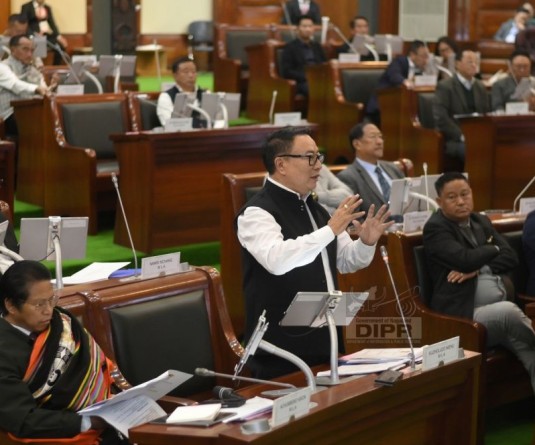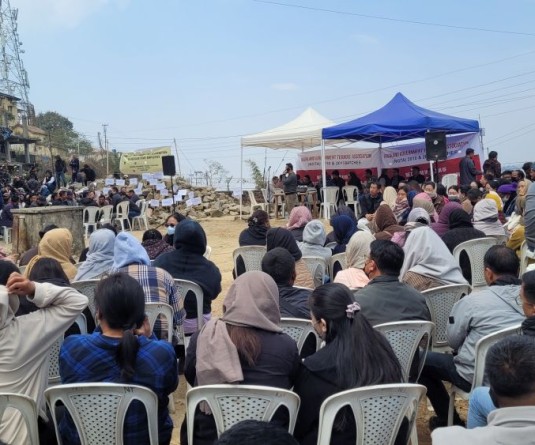
Our Correspondent
Kohima | September 19
A two day training on “Command Area Development and Water Management” (CADWM) under the aegis of North Eastern Regional Institute of Water & Land Management (NERIWALM), Tezpur and Nagaland’s state Irrigation & Flood Control department got underway here today at Irrigation & Flood Control chief engineer’s office conference hall.
State’s Irrigation & Flood Control Chief Engineer Er. S. Kughaho Sema was optimistic that the training will endeavor to develop and manage land and water resources and increase agriculture production for improving the economic health of farmers of the state.
He said many engineers have already attended similar training conducted by NERIWALM in the past. However, it assumes greater significance today with the effect of climate change already being felt in local microcosm, with unpredictable pattern and intensity of rainfall and rise in temperature becoming a reality.
He said today scarcity of water has been the most severe constraints affecting agricultural development and production. The state has experienced late arrival of rainfall during last few years. This year has been excessive rainfall, with continuous rain since first week of April.
He said excessive rainfall has caused several landslides including heavy erosion of the top soil while period of draught has caused failure of crops due to scarcity of water as well as poor management of the available water.
He stated that the subject matter of the training CADWM was most relevant and needs to be translated at the project field level for hill states like Nagaland with its fragile “Ecology and Environment.”
Course coordinator Dr. A.C. Debnath, Associate Professor (WRE) NERIWALM said the two day long training will cover CADWM programme and irrigated agriculture, preparation on DPR for CADWM project, farm development works on CADWM programme, participatory irrigation management, irrigation outlets etc. He said that CADWM’s work mainly concentrates on water management sector and stated that due to climate change the Government of India is pressing CADWM to come up with more development programmes to meet the demand of availability of water.
Dr. U.M. Hazarika, Asst Professor NERIWALM is also part of the resource person for this training. Earlier, the programme was chaired by Irrigation & Flood Control Additional Chief Engineer Er. Tsuktinungsang while vote of thanks was proposed by Irrigation & Flood Control Superintending Engineer E. Hotovi Ayemi. The programme will go on till September 20.
‘Take CADWM in integrated & coordinated manner’
Addressing the inaugural function, Parliamentary Secretary for Irrigation & Flood Control N. Jacob Zhimomi stated that all aspects of the CADWM programme needs to be taken up in all integrated and coordinated manner so as to achieve the envisaged objective of raising food grain production to meet the increasing need for growing population.
He said, “We cannot predict the climatic condition and changes over the past few years.” Referring to climate change experienced across the globe today, he said “When we expect the rainfall we don't receive and when we don't expect, we receive rainfall.”
He said the Ministry of Water Resources has set new guidelines and new schemes had been proposed and in the process a lot of time and energy had been invested by the expert team to study the environment in the various regions of the country.
He said for food grain sufficiency to meet the demand of the population “our knowledge and approach of the traditional style need to be in a scientific approach to maximize productivity.”
He was hopeful that through this training the engineers will upgrade their skills and propagate proper utilization of water and help attain self sufficiency in agri-allied sectors and contribute to the GDP of the state as well. Zhimomi said that NERIWALM is a premium institute of north east region imparting training in the field of water and land management and related fields.
He said it has become mandatory that CADWM programme has to be implemented in a holistic manner with irrigation project under PMKSY so that irrigation potential created with hydraulic connectivity gets utilized soon after its creation, improved water use efficiency, increase agricultural productivity and production and brings sustainability in the irrigated agriculture in a participatory environment.
The various components under CAWDM programme are survey, planning and designing of on-farm development works comprising of construction of field channels and also land leveling, shaping and realignment of field boundaries where necessary, extension, renovation and micro irrigation.
Zhimomi said the Nagaland Farmers Participation in Management of Irrigation Systems Bill 2013 was enacted and passed in the assembly on March 2014. The Act was required for formation and recognition of Water Users Associations (WUAs) while implementing irrigation schemes in the state.
It lays down the procedure for WUAs so formed by the farmers to manage the irrigation system developed by them. Participatory irrigation management through establishing and strengthening WUAs is an integral and important component of CADWN programme, he said.






